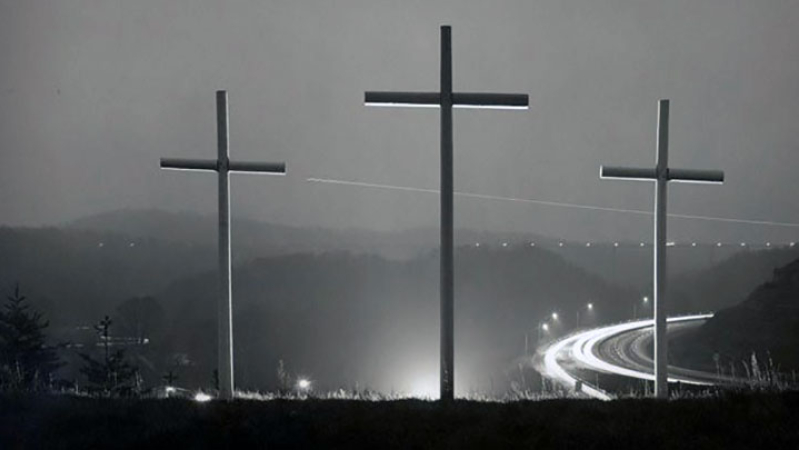
Bernard Coffindaffer, a man who used to work in the oil and coal industry, erected many crosses on private lands across the United States until he died back in 1993. Now his legacy has been passed on to a nonprofit group to carry out his mission.
In a report that aired on CBS "Sunday Morning" on Easter, reporter Billy Geist focused on the legacy left by Coffindaffer, who used his fortune to set up crosses all across the United States. He spent over $3 million to carry out his vision, much to his family's chagrin.
"I've cashed in my life insurance," Coffindaffer said back in 1993. "I cashed in my retirement plan. I cashed in everything I could cash."
Coffindaffer added that he was "a country boy" who was chosen by God "to head a major, major operation." He told Geist that the Holy Spirit came to him in 1982 after he was recovering from a heart bypass operation.
"He said, 'He wants you to put up crosses,'" Coffindaffer recalled from that vision.
Geist asked why Coffindaffer thought God chose him to complete this particular task.
"Because the Lord loves me that much," Coffindaffer said. "Absolutely. I know that's true."
Before his untimely death, Coffindaffer was aiming to erect crosses in what he considered as "trouble spots."
"I want to enter into Los Angeles and New York and all the other places where the tough people live," Coffindaffer said.
Geist's original report on Coffindaffer was supposed to air on CBS back in 1993. However, CBS News killed the report after he died suddenly from a heart attack.
"We decided it would be wrong to air our report," Geist wrote of the decision made back then.
However, Geist reported that one woman decided to carry on Coffindaffer's legacy and mission. Although she never met Coffindaffer in person, Mississippi mom and housewife Sara Abraham saved a newspaper clipping that contained his obituary back in 1993.
"One day, as I was doing a daily devotional, it fell out of my Bible," Abraham said. "As I reached down to pick it up, the Lord inspired me that I was to continue his crosses."
Abraham started a new nonprofit organization, Crosses Across America Inc., to carry out Coffindaffer's legacy to erect crosses all over the United States. According to the organization's website, about 2,000 crosses were built in the U.S., Zambia and the Philippines when Coffindaffer first carried out his mission from God.
"There are 48,000 miles of interstate highway in America," Abraham said. "We will have crosses every 25 miles all across America."
Abraham acknowledged to Geist that not everyone will appreciate these public displays of faith, despite the fact all the crosses are built on private property.
"A lot of controversial comments come out about the cross ministry, but at least it gets people talking," she said.
Geist reported that one of those crosses, a steel version weighing 25 tons, was erected on the property of Carroll and Grecian Berry, who also ran a seafood restaurant in Mississippi. Berry ended up donating nearly half the money to put up the cross, which ended up costing more than $170,000.
"They come here for the food and not realizing they're getting fed in the Gospel," Carroll said. "And when they drive by and see this cross, it reminds them: you know, there's my answer."
Berry estimated to Geist that as many as 28 million people a year would see the cross on his property. He remained unmoved by any concerns about being perceived as insane.
"You know, a lot of people will call you crazy for doing what we're doing," Carroll said. "Mr. Coffindaffer, I'm sure they thought he was crazy. He had millions and spent down to his last dollar before he went on to be with the Lord. People call me crazy, but that's fine."
Crosses Across America elaborated on the symbolism behind the crosses.
"The three Crosses symbolize Christ on the Cross flanked by the two thieves that were crucified with Him," the organization wrote.







